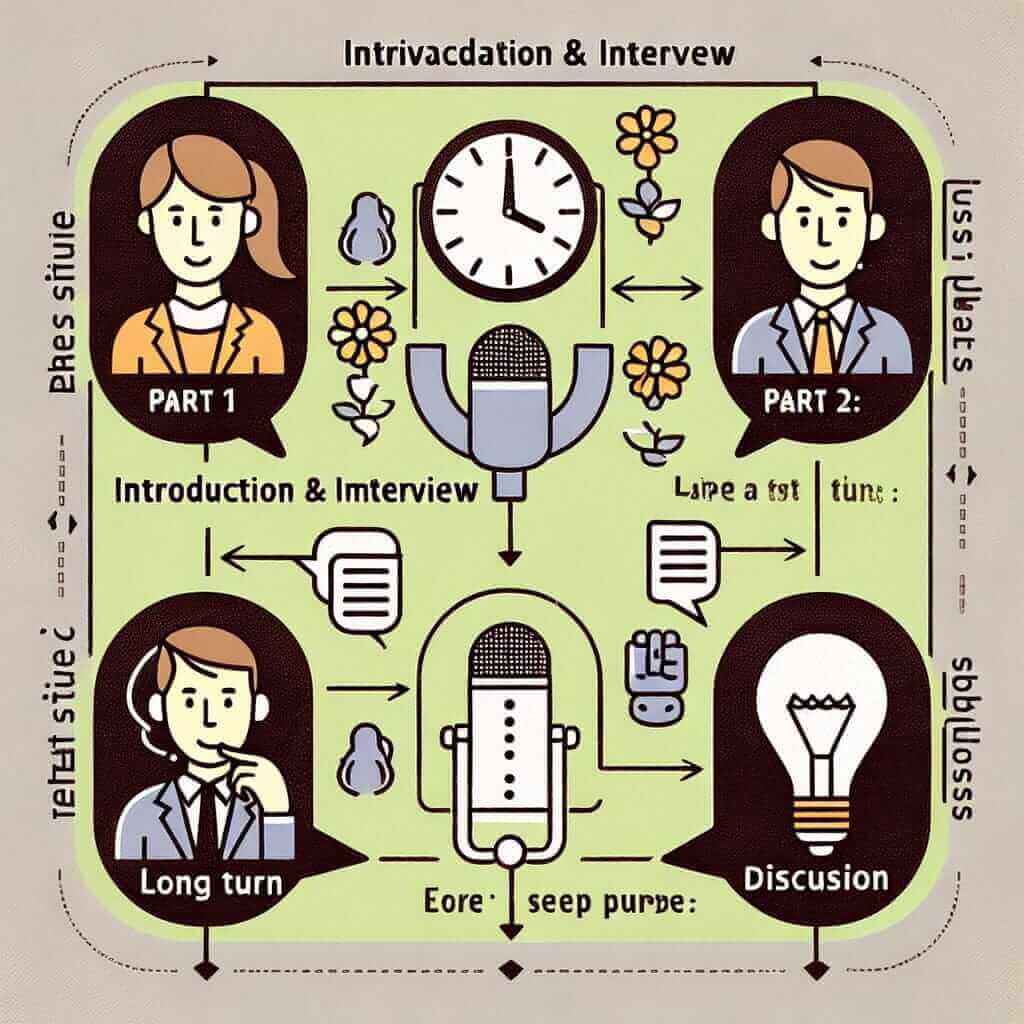The IELTS Speaking test is a crucial component of the IELTS exam, designed to assess your spoken English skills. It’s vital for test-takers to be well-prepared to achieve a high band score. In this comprehensive guide, we will explore some valuable IELTS speaking practice tips that can significantly improve your performance.
Understanding the IELTS Speaking Test
Format and Structure
The IELTS Speaking test consists of three parts, and each part has a distinct purpose. Here’s a brief overview:
Part 1: Introduction and Interview (4-5 minutes)
The examiner will introduce themselves and ask you to do the same. This segment involves questions about familiar topics such as your home, family, work, studies, and interests.
Part 2: Long Turn (3-4 minutes)
You will receive a task card with a topic and have one minute to prepare. You must then speak on the topic for up to two minutes. The examiner may ask a couple of follow-up questions.
Part 3: Discussion (4-5 minutes)
This part extends the conversation by discussing more abstract topics related to Part 2. It involves a deeper discussion and analysis of the subject.

Key Tips for Effective Preparation
1. Practice Regularly and Simulate Real Test Conditions
Regular practice is essential. Record yourself speaking for two minutes on various topics, then listen to the recordings and assess your performance. Simulating real test conditions will help you become familiar with the format and reduce anxiety.
2. Expand Your Vocabulary
Having a rich vocabulary allows you to express ideas more precisely and diversely. Create a list of common IELTS topics (e.g., education, technology, environment) and learn relevant vocabulary for each.
Example Vocabulary for Technology Topic:
- Innovate
- Digital transformation
- Cybersecurity
- Artificial intelligence
- Connectivity
3. Develop Fluency and Coherence
To score high in fluency and coherence, practice linking words and phrases to connect your ideas seamlessly. Examples include:
- Firstly, secondly, thirdly…
- On the other hand…
- As a result…
- In addition…
Example:
“Firstly, technology has revolutionized how we communicate. Secondly, it has provided access to information at our fingertips. On the other hand, it has also led to issues like data privacy.”
4. Focus on Pronunciation
Clear pronunciation is crucial. Work on your intonation, stress patterns, and rhythm. Practice by reading aloud and mimicking native speakers from movies, podcasts, or YouTube channels.
5. Manage Your Time Wisely
In Part 2, use the one-minute preparation time effectively. Outline your response briefly:
- Introduction: Restate the topic.
- Main Points: Discuss two or three main ideas.
- Conclusion: Summarize your points.
6. Stay Calm and Confident
Confidence plays a significant role in your performance. Practice deep-breathing exercises to calm your nerves before the test. Remember, it’s okay to correct yourself if you make a mistake.
Common Mistakes to Avoid
1. Overusing Fillers
Avoid excessive use of fillers like “um,” “uh,” and “you know.” They interrupt the flow of your speech.
2. Speaking Too Fast or Too Slow
Maintain a natural pace. Speaking too fast can lead to unclear pronunciation, while speaking too slow can make you seem less confident.
3. Giving Short Answers
In Part 1 and Part 3, avoid monosyllabic answers. Elaborate on your responses to showcase your language skills.
4. Ignoring Pronunciation
Ignoring pronunciation can lower your score. Pay attention to the sounds of vowels and consonants in English, and work on areas you find challenging.
How to Practice Effectively
1. Use Practice Tests
Take advantage of IELTS practice tests available online or in IELTS preparation books. They provide a clear idea of what to expect and help you gauge your progress.
2. Engage in English Conversations
Practice speaking English daily with friends, family, or language exchange partners. Engaging in real conversations can improve your fluency and confidence.
3. Record and Evaluate Yourself
Recording your speaking practice sessions allows you to identify areas that need improvement, such as vocabulary usage, coherence, or pronunciation.
4. Seek Professional Feedback
Consider working with an experienced IELTS tutor who can provide personalized feedback and guidance to help you improve your speaking skills.
Conclusion
Mastering the IELTS Speaking test requires consistent practice, a good command of vocabulary, fluency, and clear pronunciation. By following these tips and techniques, you can significantly enhance your speaking abilities and achieve a high band score. Remember, perseverance and dedication are key to success.
Feel free to leave any questions or comments below, and explore more resources on our website to further aid your IELTS preparation journey. Good luck!